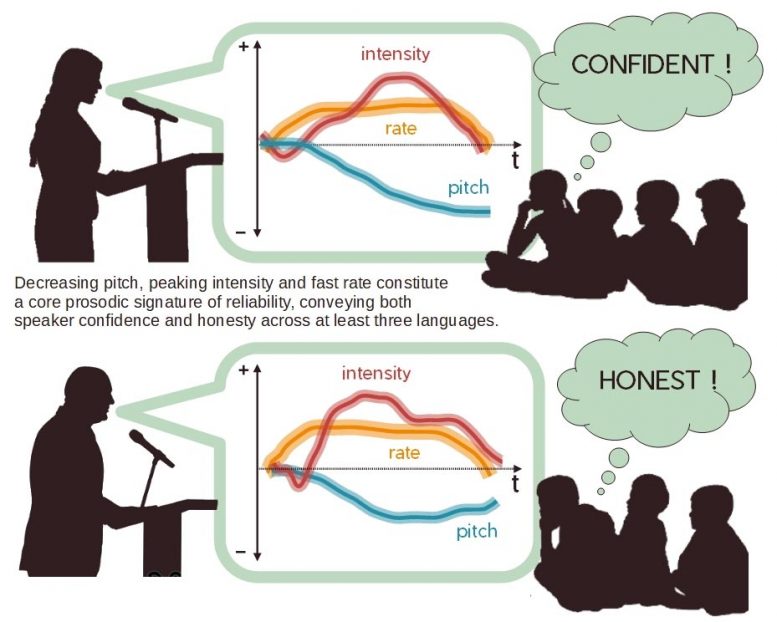
Two types of judgments (certainty, honesty) are based on a single acoustic signature: high pitch that falls at the end of the word, intensity in the middle of the word, and fast speech rate. Above: certainty, below: honesty. Credit: © Jean-Julien Aucouturier and Louise Goupil, STMS laboratory (CNRS/Ircam/Sorbonne Université/Ministère de la Culture)
Faster speech rate, greater intensity in the middle of the word, and falling pitch at the end of the word: that is the prosody[1] to adopt if one wants to come across as reliable and honest to one’s listeners.
Scientists from the Science and Technology for Music and Sound laboratory (CNRS/Ircam/Sorbonne Université/Ministère de la Culture)[2] and the Perceptual Systems Laboratory (CNRS/ENS PSL) have conducted a series of experiments[3] to understand how we decide, based on the voice, whether a speaker is honest and confident, or on the contrary dishonest and uncertain.
They have also shown that this signature was perceived similarly in a number of languages (French, English, Spanish), and that it is registered “automatically” by the brain: even when participants were not judging the speaker’s certainty or honesty, this characteristic sound impacted how they memorized the words.
Prosody consequently conveys information on the truth-value or certainty of a proposition. Scientists are now trying to understand how speakers produce such prosody based on their intentions. This research was published today (February 8, 2021) in Nature Communications.
Notes:
- Prosody refers to the “melody” of a phrase or word: its pitch, rate, and intensity.
- Jean-Julien Aucouturier now works at the FEMTO-ST laboratory (CNRS/Université de Bourgogne-Franche Comté/ENSMM/UTBM), and Louise Goupil at the University of East London.
- Scientists used vocal signal processing techniques to create random pronunciations of words (rising pitch, falling pitch, etc.), and then asked multiple groups of participants whether these words were pronounced with certainty or honesty. The software they developed as part of this effort, CLEESE, is open source: https:/
/ forum. ircam. fr/ projects/ detail/ cleese/
Reference: “Listeners’ perceptions of the certainty and honesty of a speaker are associated with a common prosodic signature” by Louise Goupil, Emmanuel Ponsot, Daniel Richardson, Gabriel Reyes and Jean-Julien Aucouturier, 8 February 2021, Nature Communications.
DOI: 10.1038/s41467-020-20649-4
Funding: CNRS; Ircam; Sorbonne Université; Ministère de la Culture; ENS PSL









As an actor, I attended voiceover school and we learned this as part of our voiceover training. Since the aim of commercial voiceover is to sell product, it is important to sound confident (in the efficacy of the product, for instance) and above all honest (to instill trust in the listener and potential purchaser).
I believe that this is also a technique used by news anchors to get people to believe their fake news.